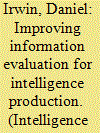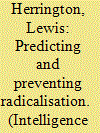| Srl | Item |
| 1 |
ID:
165669


|
|
|
|
|
| Summary/Abstract |
Recently released documentation has for the first time made it possible to describe the organizational evolution of strategic intelligence assessment in Canada. During the 60-year period surveyed in this article, the analytical groups involved in strategic assessment and the interdepartmental intelligence committee structure underwent a number of changes. These were almost invariably incremental steps—shaped by bureaucratic factors and resource constraints—rather than initiatives guided by a broader vision of the role of intelligence assessment in support of Canadian foreign and defence policy. This organizational study provides the foundation for long-overdue research into the foreign intelligence function in Canada.
|
|
|
|
|
|
|
|
|
|
|
|
|
|
|
|
| 2 |
ID:
165673


|
|
|
|
|
| Summary/Abstract |
Pro-insurgency paramilitary operations (PMOs) are a rare type of covert action that aim to destabilize or overthrow a hostile government or defeat nonstate groups with no cooperation from a host government. The article analyzes US covert operations in Syria since 2011 by applying Principal–Agent Theory (PAT) to explain the inherent difficulties involved in controlling partner states and proxies. The nature of pro-insurgency PMOs is such that main tasks have to be delegated to partners and proxies, which reduces the ability of the US government to achieve desirable outcomes, especially whenever the goals of the partners and proxies are not well-aligned with US objectives as is the case in Syria.
|
|
|
|
|
|
|
|
|
|
|
|
|
|
|
|
| 3 |
ID:
165676


|
|
|
|
|
| Summary/Abstract |
The history of Soviet espionage is largely the story of failures and defections. This article considers the possibility that a low-key dentist, who had a surgery in London in the middle of the last century, was one of the exceptions and successfully avoided detection. While I was researching in the files of several well-known Soviet agents, the name of Dr. Gessel Schkolnikoff often appeared, and then in early 2018 a Home Office file was released to the National Archives of the UK that has provided some of the missing background to this Russian immigrant. There are precedents for Soviet intelligence agencies using a dental surgery as a conduit for passing on information and there are persuasive indications that Dr. Schkolnikoff’s surgery can be added to their list.
|
|
|
|
|
|
|
|
|
|
|
|
|
|
|
|
| 4 |
ID:
165671


|
|
|
|
|
| Summary/Abstract |
National security decision-making is informed by intelligence assessments, which in turn depend on sound information evaluation. We critically examine information evaluation methods, arguing that they mask rather than effectively guide subjectivity in intelligence assessment. Drawing on the guidance metaphor, we propose that rigid ‘all-purpose’ information evaluation methods be replaced by flexible ‘context-sensitive’ guidelines aimed at improving the soundness, precision, accuracy and clarity of irreducibly subjective judgments. Specific guidelines, supported by empirical evidence, include use of numeric probability estimates to quantify the judged likelihood of information accuracy, promoting collector-analyst collaboration and periodic revaluation of information as new information is acquired.
|
|
|
|
|
|
|
|
|
|
|
|
|
|
|
|
| 5 |
ID:
165672


|
|
|
|
|
| Summary/Abstract |
This article challenges the erstwhile historical reliance upon the memoirs of the key protagonist of British Scientific Intelligence during the Second World War. Meticulous archival research has confirmed that the history of the genesis of British Scientific Intelligence has been distorted by the legacy and legend of R.V. Jones and his memoirs entitled Most Secret War. This article confirms that British Intelligence success in this regard was not solely the result of one man’s heroic accomplishments but, in reality, involved many individuals and organisations whose valuable exploits have been hidden in the shadows by Most Secret War.
|
|
|
|
|
|
|
|
|
|
|
|
|
|
|
|
| 6 |
ID:
165675


|
|
|
|
|
| Summary/Abstract |
This study explores an information interpretation explanation of strategic surprises using a non-traditional national security threat: a popular uprising. To explain why this type of assessments fail, I emphasize the role of information relevance when evaluating intelligence about civilian unrest. I posit that the dynamic nature of relevance is crucial for signals of popular dissent becoming dominant indicators that are incorporated into security assessments. A case study and observational data analysis of the Palestinian uprising (Intifada, 1987) demonstrate how information relevance contributed to the Israeli intelligence failure and how it affects the potential for strategic surprises facing a civilian threat.
|
|
|
|
|
|
|
|
|
|
|
|
|
|
|
|
| 7 |
ID:
165670


|
|
|
|
|
| Summary/Abstract |
Suicidal acts of terrorism conducted by lone actors independently of overseas command and control networks currently dominate the European landscape. Intelligence suggests from a population of fifty-two attackers between 2012 and 2017, at least 75% had a history of chronic substance abuse. Almost exclusively, Muslims do not engage in 12-step recovery programmes like Alcoholics Anonymous. We hypothesize that as both an ideology and agent of socialization, Islamic fundamentalism provides a structurally equivalent alternative. Yet, it is a programme that inadvertently directs a minority of vulnerable men along a pathway towards isolation, obsession, resentment and finally martyrdom.
|
|
|
|
|
|
|
|
|
|
|
|
|
|
|
|
| 8 |
ID:
163729


|
|
|
|
|
| Summary/Abstract |
Communication aimed at the public has been an almost absent topic in intelligence studies. This is despite a growing recognition of the importance of communicating towards the public in preventive security, counterterrorism, cyber security and organized crime prevention. This article attends to the practice of communicating intelligence to the public. It does so in order to show the diversity of communication practices in Western intelligence today. By investigating how the intelligence community communicates about ‘communication’ to the public, the article identifies three different concepts of communication, that each exposes different understandings of the public and democratic concerns.
|
|
|
|
|
|
|
|
|
|
|
|
|
|
|
|
| 9 |
ID:
165674


|
|
|
|
|
| Summary/Abstract |
The poisoning of former Russian intelligence officer and MI6 agent Sergei Skripal highlights the enduring Russian ardor for poisoning enemies of the state as a warning to others who contemplate disloyalty. Beyond treating the event itself, we explore Russian conceptions of theatrical murder as a peculiar element of state power. We historicize this development and inquire whether assassination as political theater and strategic messaging is a tool embraced in particular by Vladimir Putin or rather emblematic of the Russian state. We explore why and how Putin opted to strike at the moment he did to seek vengeance against Skripal, concluding that a confluence of structural and human factors at the intersection of British government policies with Russian domestic politics led Putin to his decision. We conclude with the implications of these findings for western governments.
|
|
|
|
|
|
|
|
|
|
|
|
|
|
|
|